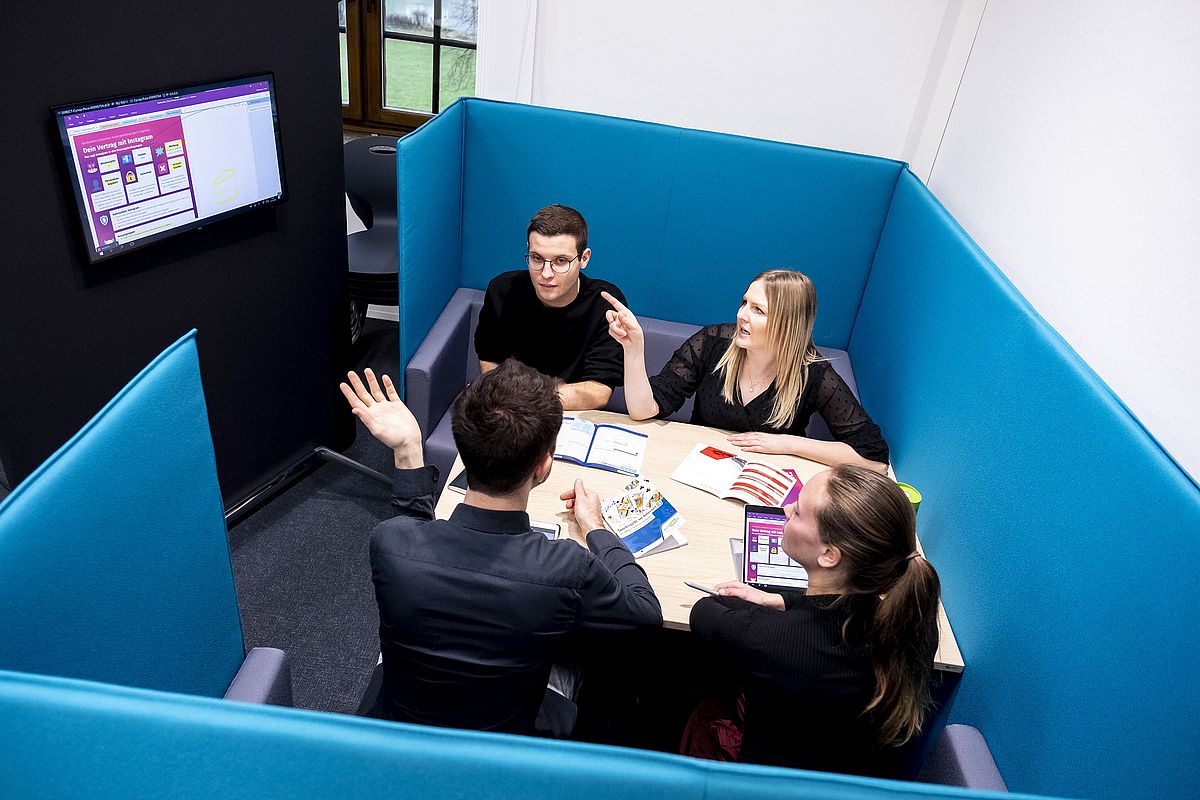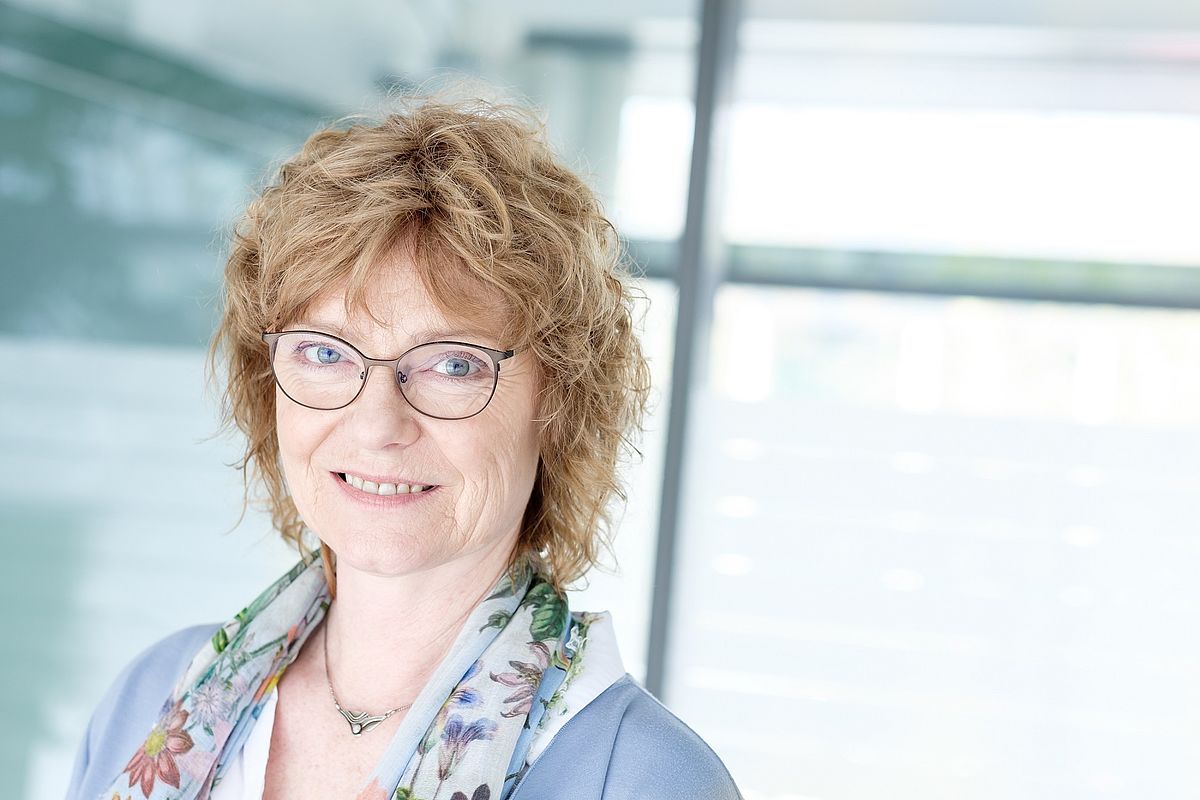When the door opens to room NK211, it looks quite different to all the other seminar rooms at the University of Passau. Between the old walls of the former Nikola monastery, with its large casement windows and stuccoed ceilings, there is furniture and equipment which hardly anyone would expect to find here; spread around are small triangular tables, some of which are pushed together to create a large, circular conference table, whilst others are placed individually depending on whether these are to be used for large discussion groups or for working in small groups. Flat-screens on the walls, flexible partition walls which function as room dividers and pin-boards in equal measure, digital whiteboards, as well as tablets, smartphones and cameras stowed away in built-in cabinets.
Next door in NK212, a similar picture; small tables, this time circular, each with a small notch, arranged in various table combinations. In one corner, a kind of alcove, a niche adorned with turquoise fabric, into which people can withdraw for more discreet conversations. In addition, there is a small adjoining room with media workstations for editing films, pictures or sound recordings. Then, there is the ‘Cube’, a meeting room separated by glass walls which can be transformed into a virtual reality room thanks to the technology available here – with frosted glass at the touch of a button.
Didactic innovation laboratories for individual working
The classrooms and teachers’/lecturers’ rooms of the future should look like this, or similar, according to the ideas and vision of the Passau Educational Scientist Professor Jutta Mägdefrau and her Chair team. The learning and instruction researcher, together with her colleague Professor Jan-Oliver Decker, the incumbent Professor of Modern German Literature & Media Semiotics, head the Project SKILL.de at the University of Passau. The project’s objectives are, firstly, to develop teaching formats which link the teaching of digital and subject-related skills; secondly, to develop teaching modules for schools and universities for digitally-supported teaching and learning; and thirdly, to ensure the transfer thereof to schools. “We want to familiarise prospective teachers/lecturers with digital technologies as early as possible, so that inhibitions about using digital media in the classroom are minimised”, explains Professor Mägdefrau. In order to test the developed concepts in practice, there is an accompanying school collaboration project alongside numerous partner schools, in which various regional primary, middle and secondary schools, as well as grammar schools, take part. In this way, the SKILL.de staff can test the results of the university’s work together with the teachers on-site, and provide feedback.
Furthermore, teachers/lecturers have the option to come to the University of Passau’s so-called DiLab, the didactic innovation laboratories, for further training.
Students in a DiLab classroom
Developing new concepts
Room NK211 is such a DiLab, the DiLab classroom, whilst NK212 is the DiLab teachers’/lecturers’ room. Both DiLabs support the digitalisation strategy of the University of Passau and are working towards expanding and promoting digitalisation in teacher education. The classroom was created as part of the SKILL.de project, the DiLab teachers’/lecturers’ room as part of the DigiLLab project. In addition, there is a miniDiLab for small groups, a so-called OER (Open Educational Resources) lab for working on OER products and processes, and a small studio for video recordings in the University of Passau’s institute building. In these new rooms, the new formats and concepts are researched, elaborated, tested and further developed with student teachers. “Each DiLab room thereby has a specific focus, but all the rooms have one thing in common, they are designed to make learning and instruction contemporary, so that individual learners can learn in the best possible way”, explains Dr. Christian Müller, one of the people responsible for the DiLabs at SKILL.de. On the one hand, this means mastering the use of digital media, but also teaching differently than has been the case hitherto. “Digitally-supported teaching requires different concepts to analogue teaching. We cannot convert classical teaching one-to-one into digital teaching”. According to Professor Mägdefrau, this conversion of digital possibilities into real didactic concepts is at the core of that which is to be developed in SKILL.de.
Dealing critically with digital media
In 2016, the SKILL project was started at the University of Passau; in 2019, SKILL.de was extended. It forms part of the second funded phase of the Quality Offensive in Teacher Training (QLB) and unites a large number of participants under the umbrella of the Teacher Education Centre & Subject Didactics (teaching methodology) (ZLF). Currently, the team consists of about 20 university lecturers and around 25 academic staff from various faculties and institutions of the university. In addition to national co-operation with schools and universities, there are also international contacts and collaborations with researchers from Chile, Austria, Sweden, Turkey, UK and the USA. The Passau team invites interested parties from Germany and abroad to contact them and join the project.
Together with student teachers, the SKILL.de team is not only researching how digital media can be used sensibly in the classroom, but also how pupils and students can learn to deal critically with digital media. “We see again and again what extreme learning needs young people have for dealing with this. Technically they know everything and can explain why this or that app on their mobile phone is not working at the present time, but they do not understand the algorithms which so fundamentally influence their digital lives. They need to learn to reflect”, warns Professor Mägdefrau.
Digitally-supported teaching requires different concepts to analogous teaching. We cannot convert classical teaching one-to-one to digital teaching.
Professor Jutta Mägdefrau
A new task for teachers/lecturers
Both Professor Mägdefrau and Dr. Müller say that the role of teachers also has to change; “they are moving from being information transmitters to communicators”, says Dr. Müller. “Due to the fact that information and knowledge are available everywhere, teachers will no longer just pass on knowledge; their job will be, above all, to help young people understand and to teach them how to deal critically with the available information”.
There is something else which needs to change in lessons/tuition: “We need to get away from the thought that teachers/lecturers are individual campaigners”, summarises the learning and instruction researcher.
More co-operation, more collaboration, more interdisciplinary projects. In the DiLab teachers’/lecturers’ room at the University of Passau, aspiring teachers/lecturers can try this out once Corona allows it: pushing tables together, working together on a subject, dedicating themselves to detailed questions in small groups, connecting with external colleagues in the ‘Cube’, or trying out virtual reality and putting themselves in the shoes of a teacher in the classroom, are all examples of this.
In order for the new teaching formats with digital media, which are being developed in SKILL.de, to be properly implemented and functioning in the classrooms and seminar rooms of the future, another important thing is needed in addition to the competence of the teachers, and that is good digital equipment – the professor’s wish; a media technician at every school and university, as the media technology support for these didactic innovations is incredibly important.
Author: Nicola Jacobi







